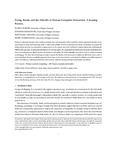Zitierlink:
10.1145/3544548.3581199| DC Element | Wert | Sprache |
|---|---|---|
| crisitem.author.orcid | 0000-0002-3190-1595 | - |
| crisitem.author.orcid | 0000-0002-8590-656X | - |
| crisitem.author.orcid | 0000-0003-2714-4293 | - |
| crisitem.author.orcid | 0000-0001-9798-1762 | - |
| dc.contributor.author | Albers, Ruben | - |
| dc.contributor.author | Sadeghian, Shadan | - |
| dc.contributor.author | Laschke, Matthias | - |
| dc.contributor.author | Hassenzahl, Marc | - |
| dc.date.accessioned | 2024-05-14T11:43:26Z | - |
| dc.date.available | 2024-05-14T11:43:26Z | - |
| dc.date.issued | 2023 | de |
| dc.description | InProceeding of the 2023 CHI Conference on Human Factors in Computing Systems (CHI '23) | de |
| dc.description.abstract | Dying is a universal experience that entails uncertainty, loss, and termination. Often, people face death unprepared and miss out on opportunities to shape their final stage of life as well as their afterlife. To better understand how thanato-technology can support the dying and the bereaved, we performed a scoping review on the current state-of-art in Human Computer Interaction. Following the PRISMA-ScR procedure, we gathered and analyzed 107 relevant papers. We categorized theoretical and conceptual contributions into three overarching themes: digital remains, remembrance, and coping. We further highlight 18 practices, such as curation, honoring and letting go. We show that technology can help to capture the identity of the deceased, to validate the life lived, and to come to terms with death. However, available approaches focus more on the bereaved than on the dying. In addition, potentially important aspects of dying (e.g., balancing involvement and autonomy, spiritual meaning-making) remain largely unexplored. | - |
| dc.identifier.doi | 10.1145/3544548.3581199 | de |
| dc.identifier.doi | http://dx.doi.org/10.25819/ubsi/10528 | - |
| dc.identifier.uri | https://dspace.ub.uni-siegen.de/handle/ubsi/2720 | - |
| dc.identifier.urn | urn:nbn:de:hbz:467-27209 | - |
| dc.language.iso | en | de |
| dc.rights | Attribution-NonCommercial-NoDerivatives 4.0 International | * |
| dc.rights.uri | http://creativecommons.org/licenses/by-nc-nd/4.0/ | * |
| dc.source | CHI '23: Proceedings of the 2023 CHI Conference on Human Factors in Computing Systems, April 2023, Article No.: 302. - https://doi.org/10.1145/3544548.3581199 | de |
| dc.subject.ddc | 004 Informatik | de |
| dc.subject.other | Death | en |
| dc.subject.other | Dying | en |
| dc.subject.other | End of life | en |
| dc.subject.other | Scoping review | en |
| dc.subject.other | Thanatosensitivity | en |
| dc.subject.other | Mensch-Computer-Interaktion | de |
| dc.title | Dying, death, and the afterlife in human-computer interaction. A scoping review | de |
| dc.type | InProceedings | de |
| item.fulltext | With Fulltext | - |
| ubsi.origin.dspace5 | true | - |
| ubsi.publication.affiliation | Fakultät III - Wirtschaftswissenschaften, Wirtschaftsinformatik und Wirtschaftsrecht | de |
| ubsi.source.author | Association for Computing Machinery | de |
| ubsi.source.conference-end | 28.04.2023 | de |
| ubsi.source.conference-place | Hamburg | de |
| ubsi.source.conference-start | 23.04.2023 | de |
| ubsi.source.conference-title | CHI Conference on Human Factors in Computing Systems (CHI '23) | de |
| ubsi.source.isbn | 978-1-4503-9421-5 | - |
| ubsi.source.issued | 2023 | de |
| ubsi.source.pages | 16 | de |
| ubsi.source.place | New York | de |
| ubsi.source.publisher | Association for Computing Machinery | de |
| ubsi.source.title | Proceedings of the 2023 CHI Conference on Human Factors in Computing Systems | de |
| ubsi.source.url | https://www.acm.org/ | de |
| Enthalten in den Sammlungen: | Publikationen aus der Universität Siegen | |
Dateien zu dieser Ressource:
| Datei | Beschreibung | Größe | Format | |
|---|---|---|---|---|
| Dying_death_and_the_afterlife_in_human-computer_interaction.pdf | 429.91 kB | Adobe PDF |  Öffnen/Anzeigen |
Diese Ressource ist urheberrechtlich geschützt. |
Seitenansichten
300
checked on 02.04.2025
Download(s)
204
checked on 02.04.2025
Google ScholarTM
Prüfe
Prüfe
Diese Ressource wurde unter folgender Copyright-Bestimmung veröffentlicht: Lizenz von Creative Commons


